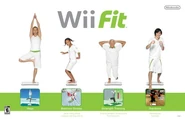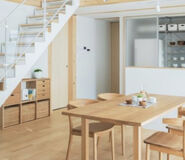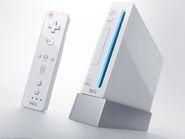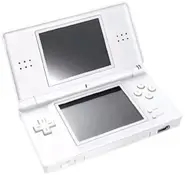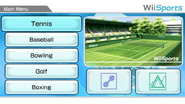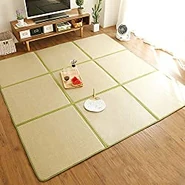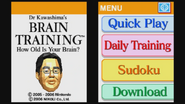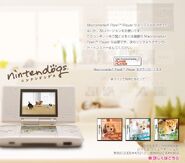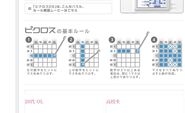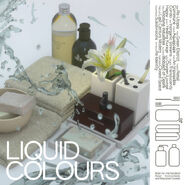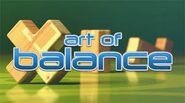This article is part of a series on the Frutiger Family
Technozen is an aesthetic primarily inspired by the aesthetics of Mid/Late-2000s Japanese technology. It can be described as cold, sterile, and professional looking, and at the same time, cozy, friendly, and cute. It is the Japanese counterpart of Frutiger Aero and it is described as a sub-aesthetic of it; however, Technozen is largely evocative of Asian design while Frutiger Aero is more global.
Technozen was also popular in the realm of music, examples including the Wii Main Menu Music (2006) and Golden Sky by Jan Cyrka (2008) featured in the "A Day Made of Glass" videos.
Visuals[]
Visual inspiration originates from a wide variety of sources, Mid/Late-2000s Japanese (and some Korean technology) being a major inspiration. Examples of Technozen technology include the Nintendo Wii, Honda Asimo, Sony Aibo, Toyota bB/Scion xB (first generation), Nintendo DS, Panasonic Let's Note, Garakei cell phones, PDAs, Digital Ink E-Readers, and Casio Electronic Dictionaries.
Music[]
Technozen's music is often similar to and often is a part of tracks heard in Nintendo games, particularly on the Wii and DS. Technozen's music generally embodies a laid-back feeling, often utilizing glossy synths, highly quantized sampled acoustic instruments, electric pianos, soft flutes, and occasionally accordions. Influences range from New Age music, Synthwave, City Pop, Muzak, Bossa Nova, and Latin music. The music is typically instrumental, but it doesn't necessarily have to be.
Artists
- Nintendo
- Gabriel Gundacker
- Mitch Murder (Specifically his Salary Man Simulator albums)
- Asuka Ito
- CFCF(Liquid Colors & The Colours of Life)
- Rei Harakami
- Diverse Sytem .works compilations
- sylcmyk (Sylvester Draggon Jr)
- Kshiraki (Kohei Shiraki)
- Thinktec
- Nash Music Library (Japanese stock music company; not all of the music is Technozen but a lot of it is)
- Ken Ishii
- Capsule
- Serani Poji
Philosophy & Lifestyle[]
The "Zen" in "Technozen" is due to its association in the west with Minimalist Asian aesthetics and its philosophy of simplicity. It's secular and unrelated to the Japanese meaning of Zen which pertains to a sect of Buddhism.
Philosophy[]
The Technozen philosophy is centered around the harmonizing of technology and nature. It is a rejection of the fast-paced modern tech culture, favoring a more laid-back lifestyle. It is based on the belief that technology should improve life but not totally dominate it, it being minimalistic, but not to an absurd degree. The philosophy is not based on asceticism or extreme frugality; rather, it is based on simplicity and beauty. There is also a focus on health and wellbeing.
Lifestyle[]
The Technozen technology design philosophy is small and boxy, based on the idea of doing more with less space as opposed to doing less with more space. Utilizing both form and function on objects is also a key motif, being based on the idea that devices should be easily repaired and promotes the rejection of planned obsolescence. It can also be seen as a rejection of modern Big Tech monopolies, algorithms and internet overuse. Technozen favors helpful, user-friendly, but self contained gadgets which give power to the user rather than having power over the user. One of Technozen's core motifs is caring for the environment, reminiscent of green technology like Solarpunk but more politically neutral. Unlike Solarpunk, Technozen is not anti-capitalist, being open to people of various political leanings provided they care about the environment.
Games[]
- Any Sudoku game
- A-Train series (1985-present)
- Densha De Go series (1996-present)
- Roommania #203 (2000)
- Brain Age series (2005-2020)
- Nintendogs series (2005-2011)
- Electroplankton (2005/2006)
- Cooking Mama series (2006-present)
- Wii Sports (2006)
- Wii Play (2006/2007)
- Artstyle (2008)
- Picross DS (2007)
- Wii Fit (2007/2008)
- Endless Ocean (2007-2008)
- Sim City Creator (2008)
- Style Savvy series (2008-2017)
- Picross 3D (2009/2010)
- Art of Balance (2010)
- Art Style series (2008-2011, developed by Skip ltd)
- Comic Workshop 1 & 2 (2014-2015, 3DS)
- Mom Hid My Game (2016)
- Nintendo Labo (2018-2019)
- Ring Fit Adventure (2019)
- Clubhouse Games 51 Worldwide Classics (2020)
- Unpacking (2021)
- Nintendo Switch Sports (2022)
- Doki Doki Literature Club! (2017)
Interior Décor[]
Technozen interior design is intended for bright, well-lit areas, with lots of diffuse white light and few prominent shadows. It centers around minimalist white and light wood tones, with the rest of its palette range often serving as an accent. White plastics or paints used in Technozen can be matte, glossy, or a combination. Wood is typically unstained light woods, with a de-emphasized and unprominent wood grain. Bamboo can be used as a material, but it is rare to see distinctly "bamboo" shapes. Regardless of the material used, furniture is usually in artificial looking and mass producible shapes.
Unlike normal Minimalism, rooms are made to be functional (often including storage) and are frequently accessorized with bright or cute things. Houseplants and electronics are common, fitting with its philosophical leanings.
Items[]
Home décor from Japanese variety store MUJI leans a lot towards Technozen, and "MUJI-style" rooms commonly embody this aesthetic.
Asian franchises:[]
- Muji
- Uniqlo
- Daiso
- Miniso
Scandinavian interior décor follows similar design principles, sometimes aligning with or borrowing from this aesthetic (notably IKEA).
Marie Kondo's KonMari design philosophy strongly embodies Technozen: Asian-inspired minimalism, while hanging on to things that "spark joy".
Resources[]
External links to help get a better understanding of this aesthetic.
- https://mitchmurder.bandcamp.com/album/salary-man-simulator
- https://mitchmurder.bandcamp.com/album/salary-man-simulator-2-corporate-retreat
- https://gabrielgundacker.bandcamp.com/album/unofficial-wii-sports-soundtrack
- https://kinwav.tumblr.com/
- https://tancla.bandcamp.com/album/wii-sporty-music
- https://soundcloud.com/garrisonmorton/sets/wii-style-music
- https://soundcloud.com/garrisonmorton/sets/technozen-originals
- https://www.youtube.com/playlist?list=PLSHbn8ag9TRqD_6bdPEJH58rqHRF6mVoe
- https://www.youtube.com/playlist?list=PLSHbn8ag9TRpr8nCQeOm5shLGSr5fTFfA

